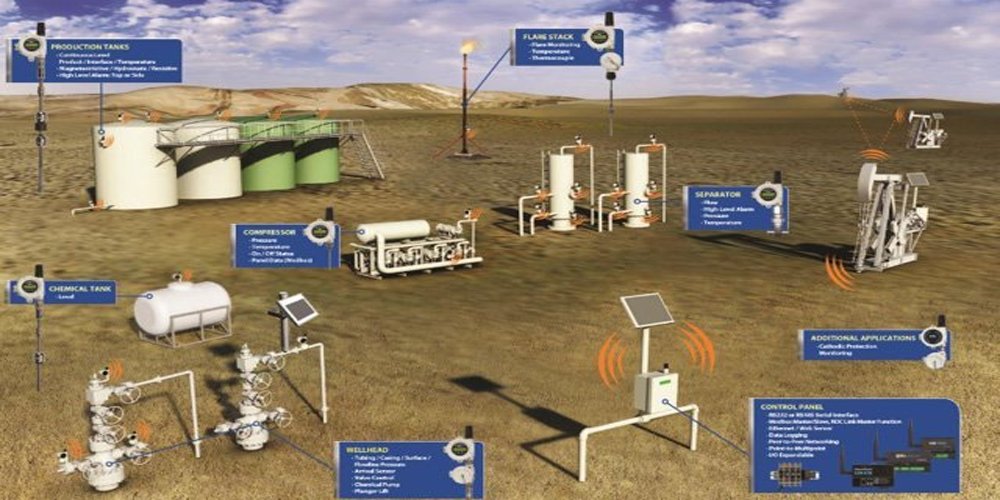Home >> Applications
Oil and gas production sites are often widely distributed in sparsely populated areas with extreme weather conditions and complex terrains. The environment around them is quite harsh and there are few or even no available means of communication. Radio modem has emerged as a crucial component in enhancing the monitoring process, ensuring the safety and productivity of oil and gas operations.
Radio modems offer flexibility in terms of communication range. Depending on the specific model and power settings, it can cover short distances within a single oil field facility or extend over long distances to connect multiple well-sites to a central monitoring station. Additionally, radio modems support various data transfer rates, which can be adjusted according to the requirements of different monitoring applications. This adaptability makes it suitable for transmitting different types of data, from real - time sensor readings to large - volume historical data.
1. Oil and Gas Well-Site Monitoring
At well - sites, a large number of sensors are deployed to monitor parameters such as pressure, temperature, flow rate of oil and gas, and the status of pumping units. Radio modem enables seamless communication between these sensors and the local data acquisition system. For example, pressure sensors installed in oil wells continuously measure the underground pressure. The data collected by these sensors is converted into digital signals and then modulated by radio modems for wireless transmission to the nearby data collection point. This real - time data transmission allows operators to quickly detect any abnormal pressure changes, which could indicate potential issues such as wellbore leaks or reservoir depletion.

2. Pipeline Monitoring
Oil and gas pipelines span vast distances, and monitoring their integrity is crucial for preventing leaks and ensuring the smooth flow of products. Radio modems are used to connect distributed sensors along the pipeline. These sensors can detect factors like pipeline corrosion, stress levels, and any unauthorized tampering. By transmitting the data wirelessly through radio modems, pipeline operators can remotely monitor the entire pipeline network. In case of an emergency, such as a pipeline leak, the system can immediately send out alerts, enabling prompt response and minimizing potential environmental and economic damage.

3. Centralized Control and Management
In a large - scale oil and gas production operation, multiple well - sites and pipelines need to be coordinated and managed from a central control center. Radio modems play a vital role in establishing a communication link between the field devices and the central control system. It enables the transfer of aggregated data from various sources to the central station, where operators can analyze the overall production situation, make informed decisions, and remotely control certain field equipment. For instance, they can adjust the pumping speed of oil pumps at different well - sites based on the real-time production data received via radio modems.

The use of radio modems in oil and gas production monitoring offers several advantages. Firstly, it achieves communication distances that cannot be reached by wired transmission. Wireless communication via radio modems simplifies the installation process, speeds up the deployment of monitoring systems, and lowers the overall infrastructure cost.
Secondly, it provides high reliability. With advanced error - correction and signal - strengthening techniques, radio modems can ensure the accurate transmission of data even in the presence of interference. This reliability is essential for critical monitoring applications in the oil and gas industry, where inaccurate data could lead to incorrect decisions and potential disasters.
Finally, radio modems offer scalability. As the oil and gas production operations expand, new well - sites can be easily integrated into the existing monitoring system by simply adding more radio modem devices. This scalability allows the monitoring system to grow in line with the development of the business without major overhauls of the communication infrastructure.
Radio modem has become an indispensable part of modern oil and gas production monitoring systems. Its unique characteristics, wide range of applications, and numerous advantages contribute to improving the safety, efficiency, and productivity of the oil and gas industry. As technology continues to evolve, radio modems are expected to play an even more significant role in the future of oil and gas production.
Applications of Radio Modems in SCADA Systems
Applications of Radio Modems in PLC Systems
Applications of Radio Modems in Telemetry systems
Applications of Radio Modems in Electrical Power Transmission / Distribution
Applications of Radio Modems in Oil and Gas Production Monitoring
Applications of Radio Modems in Wastewater Collection and Treatment Facilities.
Applications of Radio Modems in Agricultural Automatic Irrigation